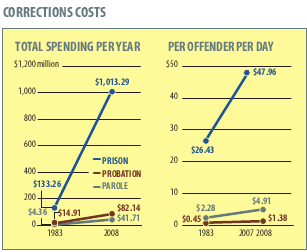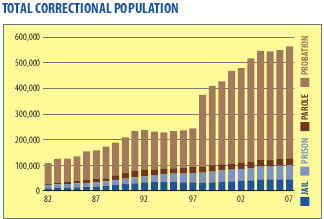The governor of Ohio created a budget shortfall, and wants to solve it
by selling off private prisons in “a yard sale” in a recession,
like “a junkie” for “his next fix.”
According to testimony by a nonpartisan research institute:
“The biggest source of Ohio’s budget problem is not overspending or
compenstation for public employees. It is a reduction in revenue.
…
The tax changes also were weighted to high-income Ohioans. More than 40
percent of the income-tax cuts are going to the five percent of families
with income of $135,000 or more a year. Meanwhile, the bottom three-fifths
of Ohio families will receive just 13 percent of the total tax cut.
According to
a recent poll,
the people of Ohio think this is unfair and don’t believe the governor
can fix the budget without raising taxes.
There are other reasons selling off prisons to private prison
companies such as CCA is a bad idea.
 Mark Niquette wrote for Bloomberg 29 June 2011,
Kasich Tries to Avoid Arizona’s Mistakes in Ohio Prison Selloff:
Mark Niquette wrote for Bloomberg 29 June 2011,
Kasich Tries to Avoid Arizona’s Mistakes in Ohio Prison Selloff:
 Still, Democratic lawmakers, including Representative Matt Lundy of
Elyria, question whether Ohio is making a wise move.
Still, Democratic lawmakers, including Representative Matt Lundy of
Elyria, question whether Ohio is making a wise move.
“The buyer wins and the taxpayers lose when we sell in the middle of
a recession,” Lundy said during press conference last month, calling
the move “a yard sale.”
 Selling assets for “one-time” money is a mistake, Louisiana Treasurer
John Kennedy said. He opposed a plan by Republican Governor Bobby Jindal
to sell three prisons to raise $90 million, a proposal the Legislature
didn’t approve.
Selling assets for “one-time” money is a mistake, Louisiana Treasurer
John Kennedy said. He opposed a plan by Republican Governor Bobby Jindal
to sell three prisons to raise $90 million, a proposal the Legislature
didn’t approve.
“A junkie can sell his TV or his stereo or his iPod and generate money
for his next fix,” Kennedy, also a Republican, said in a telephone
interview from Baton Rouge, Louisiana. “But if he’s going to ever
get well, he needs to face his addiction.”
An even better quote in that story comes from CCA’s own Steve Owen:
Continue reading →
“more than 14 million pounds of beef infected with rat feces processed by inmates were not recalled, in order to avoid drawing attention to how many products are made by prison labor.”










 That costs us more than a billion dollars a year in tax money,
5.9% of the state budget.
That’s up from $133.26 million in 1983, increased by more than a factor of seven.
That costs us more than a billion dollars a year in tax money,
5.9% of the state budget.
That’s up from $133.26 million in 1983, increased by more than a factor of seven.
 Meanwhile, the correctional population swelled from around 100,000 in 1982 to more
than 550,000 in 2007.
And while other states have started decreasing their prison populations,
Georgia’s
Meanwhile, the correctional population swelled from around 100,000 in 1982 to more
than 550,000 in 2007.
And while other states have started decreasing their prison populations,
Georgia’s